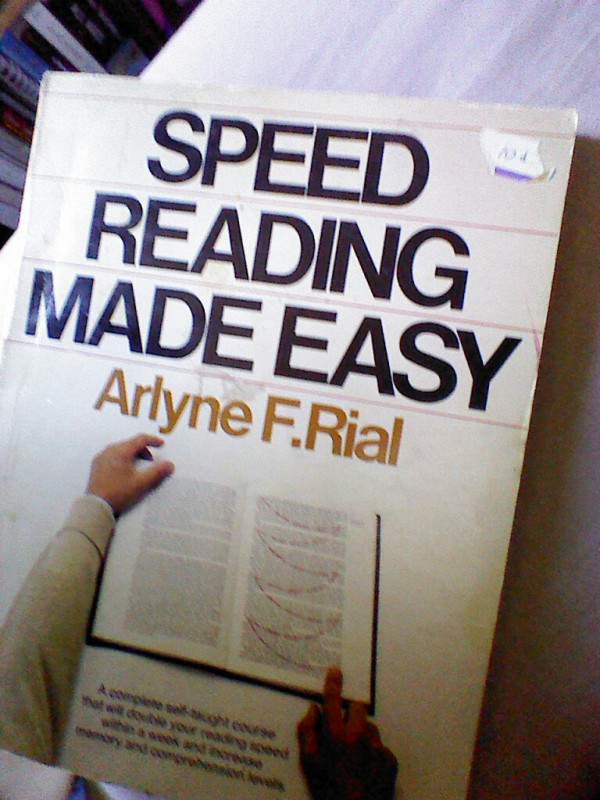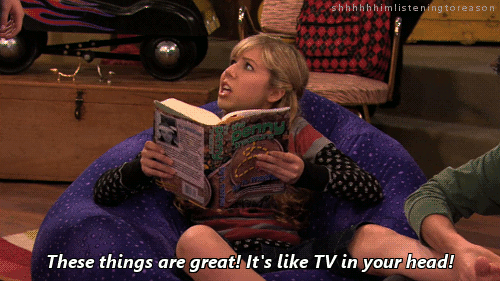Currently reading
This Week in Reading News:
While walking dogs last week I met a woman who had managed to achieve something I found really remarkable: she was actually reading while walking a dog. Now, I've seen and marveled over folks that could read and walk at the same time, I've even tried it myself (and determined it was not for me.)
But reading and dog walking is a singularly high level skill, I'm sure. There are a whole other set of things to deal with, besides getting run over by a car, there's things you can step in, cats that might get chased, and if you manage to do it without getting knocked over or hurt, my hat is off to you.
So I decided that if I ever see this woman again in the neighborhood, I'll ask her what she's reading, because it must be some awesome reading material. This time it was Dorothy Dunnett, so I made sure I put that on my "to read" list...
I recently did a book review for Hay House, and here it is, if you'd like to read it:
http://hermworld.blogspot.com/2013/07/the-miracles-of-archangel-gabriel-by.html
Seems like a really cool way to get free books.
And speaking of free books, I guess I won a contest back there, because I was pleasantly surprised when I got Lauren B. Davis' book "Our Daily Bread" in the mail! After reading the first chapter, folks, this looks like a barn-burner of a book! Can't wait to review it here--what a cool way of discovering an author.
You know you maybe have a problem reading too much when...
You don't go to work simply because you're at the library and you just don't feel like leaving.
This happened on Tuesday.
For some reason, probably because I had stayed up really late the night before and my judgement was cloudy, it was more important to stay in the chair and skim/read Pete Townsend's autobiography. I did read just about all of it in one sitting, but it wasn't really that remarkable.
Again, was drawn to this book because I'm a fan of the Who. Pete himself wasn't really happy being in the Who during its later years. There was the usual rock star "Took these drugs, bedded this girl" stuff, and there was also some "Keith Moon was often irritating, but I loved him anyway." stuff--you'd be irritated with his antics sometimes too, if he'd blown out your eardrums with too much gun powder in an exploding drum kit. And set fire to your hair.
On the whole though, kind of a flat, boring book. After his book, "Horse's Neck" and his catalog of musical work, I guess I expected a little more.
So, yeah, it wasn't bad.
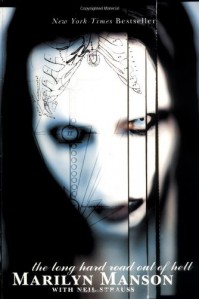
So Brian Warner turned out to be not so completely unlikable after all. This might have been due to his making an occasional reference to the fact that he is something of a reader himself, can't hate on someone who reads. I always have sort of liked him, by the way, I am an MM fan.
It really only took me two days to read--usually I devour biographies really fast, faster if they're raging potboilers, like this one was. I think what I was going through my mind with my last journal post was this kind of weird boredom that overtakes me when I read too much stuff like, "I bleeped this girl, then I took massive quantities of this drug..." which there is definitely a lot of in here.
There is also a thick ribbon of misogyny running through the book, but that is hardly unexpected, given the subject. You do get the idea that he had something of a sad childhood, where there was really nothing to be happy about, perhaps the exception of his friendship with his cousin, but you really get the feeling that some of us have out there of being really unhappy with modern suburban life.
There is also a sense that he really tried to make something out of that unhappiness, to really lead a more creative and redeeming life than the average rock and roll loser. He seems to have achieved that. Let's hope he doesn't turn out too much like Elvis.
#Books
Reading Marilyn Manson's autobiography; don't know whether to be disgusted or just sad.#Books
— Hermgirl (@Hermgirl) June 11, 2013
Now I've got to find and read everything this guy wrote!

You'll likely find yourself thinking the same thing if you read this.
This is the "Psycho" author's take on the "Soylent Green" style overpopulation story. Like another reviewer, I felt it somewhat ironic that in a culture where everything is minutely regulated, they hadn't quite gotten around to regulating birth control or sterilization methods. This is an easy detail to overlook, however, the main bulk of the story being so well done.
It's also kind of funny to be actually *living* during the era in which an author "predicts" such dire yet at the same time technologically advanced circumstances. I got that same feeling from a lot of futuristic sci fi.
Having said all of that, it's a really great story, it has that old school, pulp fiction feel to it (mainly beause it's by an old school pulp fiction author) and you'll want more, if you're like me.
Knowing that the book is usually better than the movie, I can't wait to get my hands on "Psycho" now.

The comedian takes us through his life growing up in the sixties and seventies, with a generous sprinkling of sarcasm and heart-felt as well as humorous observations along the way.
Black is an extremely political animal, with a left-leaning libertarian slant. Some of the material in this book is a re-hash of some of his television bits on Comedy Central, but there is enough fleshing out that framework to make it worthwhile.
For this sentence alone, the book is worth the price of admission: "While Nixon spoke, I rubbed the shit across his televised face." I laughed out loud, and I think my grandmother, who hated Nixon with a passion, would have laughed too (even if she was a trifle red-faced.) She would have really enjoyed this book, and that's as good an endorsement as I can possibly give any book.
Bravo, Mr. L.!
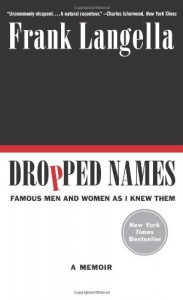
Frank Langella as an actor is one of those guys who doesn't go in for a lot of rigmarole; he just does the job. I happen to think he does it quite well--check out the 1979 version of Dracula, or The Ninth Gate, where he stood out well against Johnny Depp's scenery chewing performance if you don't know what I'm talking about.
On to the book review, though (one gets the impression Mr. L. wouldn't stand for too much ass kissing about his accomplishments, "Get it done." he might say.)
As a memoir, this is adequate. There are some details about his life, how he started in acting as a theater apprentice, how he eschewed the Actor's Studio way of acting in favor of Stella Adler, how he met JFK as a young man, his friendships with people like Raul Julia, Alan Bates, a few people he didn't care for, such as Rex Harrison, he tells it like it was. There were some details about ladies he dated that seemed like too much information--not salacious details, just stuff that seemed a little unflattering.
This is more of a remembrance of the more famous and the slightly less famous people Frank has known, basically, it does what it says on the tin. Again, don't look to this for overly salacious dish, but do appreciate the way he reveals his own character and values in the way he speaks about friends and the not so friendly.
If you're a fan like I am, this book is highly recommended.

As a person who was a little dissatisfied with my college experience, I was relieved to know I wasn't the only one. It was also interesting to learn the possible reasons behind so many consumers--for that is in fact what we are--being left out in the cold after sacrificing so much and putting so much on the line.
This book is just the beginning of what I'm sure will be a very long discussion about education, how it can be changed, what can be used instead of the traditional way of doing things.
I liked this book, and didn't like it.

I like that the connections with antiquity are found in classic literature, such as Byron, Shelly, and Swinburne, rather than insisting on connection with some kind of lineage that goes back to ancients. I have a theory that while there was "a witchcraft" in pretty much every religion and culture throughout history, Wicca itself, and by extension most modern paganism, is a modern invention of many different things taken from different places.
After reading this I feel like I have a much better handle on both the Dorothy Clutterbuck and Margaret Murray issues that one hears so much about on Teh Intarwebz.
I liked learning more about the Masons and their connection and similarities to early labor unions and guilds.
Where I found myself floundering with the book was in the sections on "cunning folk", which left me feeling the way I did when I was wallowing through Colin Wilson's "The Occult"--indeed, at one point, Hutton acknowledges a literary debt to Wilson.
Towards the end there is also a bit of a dank feel, as the Gardnerian, Alexandrian, and subsequent traditions are expounded on, and the comings and goings of the players on the stage traced. The value in this is only in being able to find out where to go for more information.
There were many enjoyable moments in this book, and equally as many "Is this something I really *need* to know?" moments. As with any book of this much academic depth, I could probably benefit from reading it again sometime down the road.
DIY U: Edupunks, Edupreneurs, and the Coming Transformation of Higher Education
 As a person who was a little dissatisfied with my college experience, I was relieved to know I wasn't the only one. It was also interesting to learn the possible reasons behind so many consumers--for that is in fact what we are--being left out in the cold after sacrificing so much and putting so much on the line.This book is just the beginning of what I'm sure will be a very long discussion about education, how it can be changed, what can be used instead of the traditional way of doing things.
As a person who was a little dissatisfied with my college experience, I was relieved to know I wasn't the only one. It was also interesting to learn the possible reasons behind so many consumers--for that is in fact what we are--being left out in the cold after sacrificing so much and putting so much on the line.This book is just the beginning of what I'm sure will be a very long discussion about education, how it can be changed, what can be used instead of the traditional way of doing things.
I'd Change My Life If I Had More Time: A Practical Guide to Living Your Dreams: A Practical Guide to Making Dreams Come True
 Not the best, but it didn't suck. Had some good, if rudimentary stuff about meditation at the end. This was more a book for harried housewives than spiritual seekers, Virtue talks about *being* a harried housewife herself.
Not the best, but it didn't suck. Had some good, if rudimentary stuff about meditation at the end. This was more a book for harried housewives than spiritual seekers, Virtue talks about *being* a harried housewife herself.
The Witch And Wizard Training Guide
 Well, it didn't COMPLETELY suck, I guess it was kind of mediocre the whole way through, with a few moments, where I said to myself, "Weeell, I wouldn't tell new pagan seekers stuff like THAT..."Things like saying that wood for a new wand absolutely must be gotten by taking it straight off a living tree (I've actually gotten a few nice wands from tree limbs that had fallen off a tree or were cut by a gardener, etc--I personally feel taking straight from the tree would be an act of violence, but that's just me.)And while there's no reason you can't make "potions" in a blender, it came off as looking like so many fruit smoothie recipes (again, no reason you can't make a magical smoothie) rendering it a little silly.The part I had the biggest problem with was the fact she teaches love spells to newbies without any discussion about the ethics of love spells. Just, boom here's a love potion. This book was very obviously written to capitalize on the Harry Potter phenomenon, (indeed, she dedicates the book to her husband, son, and J. K. Rowling and the readers of HP) and I would rate this as a one and a half star book rather than a true two stars.
Well, it didn't COMPLETELY suck, I guess it was kind of mediocre the whole way through, with a few moments, where I said to myself, "Weeell, I wouldn't tell new pagan seekers stuff like THAT..."Things like saying that wood for a new wand absolutely must be gotten by taking it straight off a living tree (I've actually gotten a few nice wands from tree limbs that had fallen off a tree or were cut by a gardener, etc--I personally feel taking straight from the tree would be an act of violence, but that's just me.)And while there's no reason you can't make "potions" in a blender, it came off as looking like so many fruit smoothie recipes (again, no reason you can't make a magical smoothie) rendering it a little silly.The part I had the biggest problem with was the fact she teaches love spells to newbies without any discussion about the ethics of love spells. Just, boom here's a love potion. This book was very obviously written to capitalize on the Harry Potter phenomenon, (indeed, she dedicates the book to her husband, son, and J. K. Rowling and the readers of HP) and I would rate this as a one and a half star book rather than a true two stars.



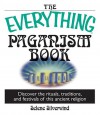






 2
2
 1
1

